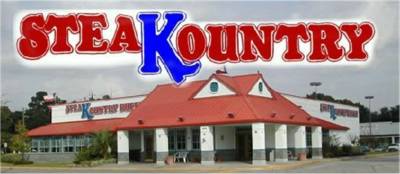TTAB Sticks A Fork In "STEAKCOUNTRY" Mark
Several years ago, in an article entitled "The Top Ten Losing TTAB Arguments", I chose as the number one losing argument a party's attempt to overcome a Section 2(d) likelihood of confusion refusal by seeking limitation of the identification of goods or services in an involved application or registration. The TTAB, of course, looks to the goods and services as identified, and will not read in limitations based on actual use of the marks.
That same meatless argument was served up by the unsuccessful applicant in In re Lidl Stiftung & Co. KG, Serial No. 76297319 (December 30, 2004) [not citable], in which the Board affirmed a Section 2(d) refusal to register the mark STEAKCOUNTRY for meat products and prepared meals, finding it likely to cause confusion with the mark STEAKOUNTRY, registered in both block-letter and stylized form for restaurant services.

The Examining Attorney contended that the marks are "very similar in commercial impression and identical in pronunciation." Numerous third-party registrations showed "it is reasonable for purchasers to expect both food products and restaurant services to emanate from a single entity" under the same mark.
Lidl Stiftung urged that "STEAK" is a weak formative and that the marks are otherwise distinguishable. As to the involved goods and services, it argued that they are distinct and are offered in different channels of trade: Applicant's goods in its own discount retail food stores, and registrant's services in its own all-you-can-eat buffet restaurants.

The Board not surprisingly agreed with the PTO that the marks are substantially identical. As to the goods/services, the Board pointed out once again that it must analyze the case based upon the goods and services as set forth in the application and registration -- not on the actual use of the marks. Citing, as usual, Canadian Imperial Bank of Commerce v. Wells Fargo Bank, 1 USPQ2d 1813 (Fed. Cir. 1987), the Board declared:
"Because there are no limitations in the respective application and registrations relating to the channels of trade or classes of purchasers, we must presume that applicant's goods and registrant's services encompass all goods and services of the type described, and that they move in all normal channels of trade to all potential customers."
The Board therefore concluded that consumers would likely be confused as to the source of Lidl Stiftung's STEAKCOUNTRY products.
As a side note, in cases in which the identification of goods or the recitation of services in a cited registration is overly broad (e.g., a registration for "computer software"), partial cancellation under Section 18 of the Trademark Act may be available. Such partial cancellations are, if not rare, at least medium rare.




0 Comments:
Post a Comment
<< Home